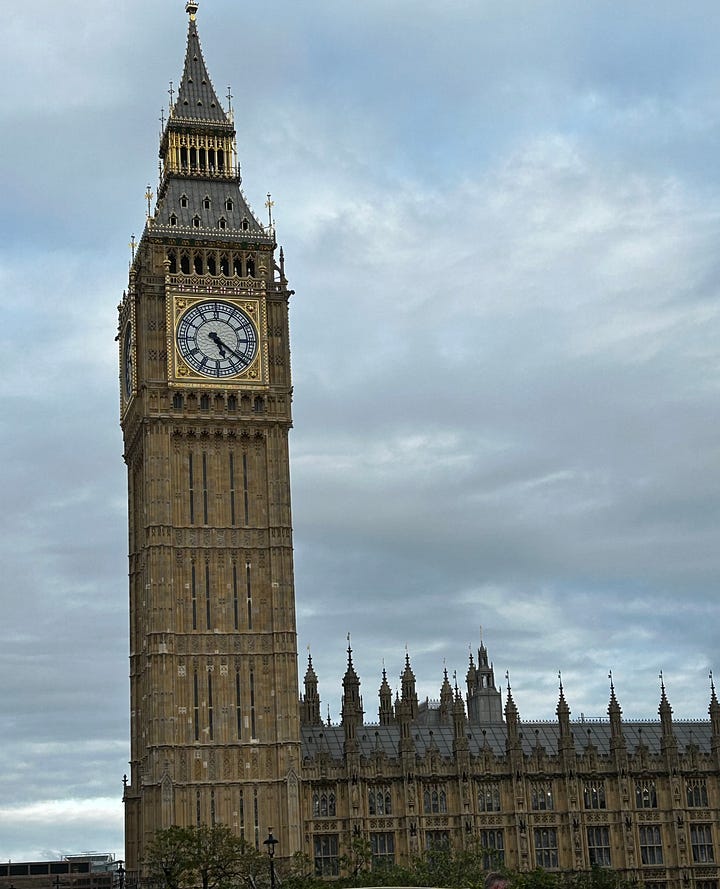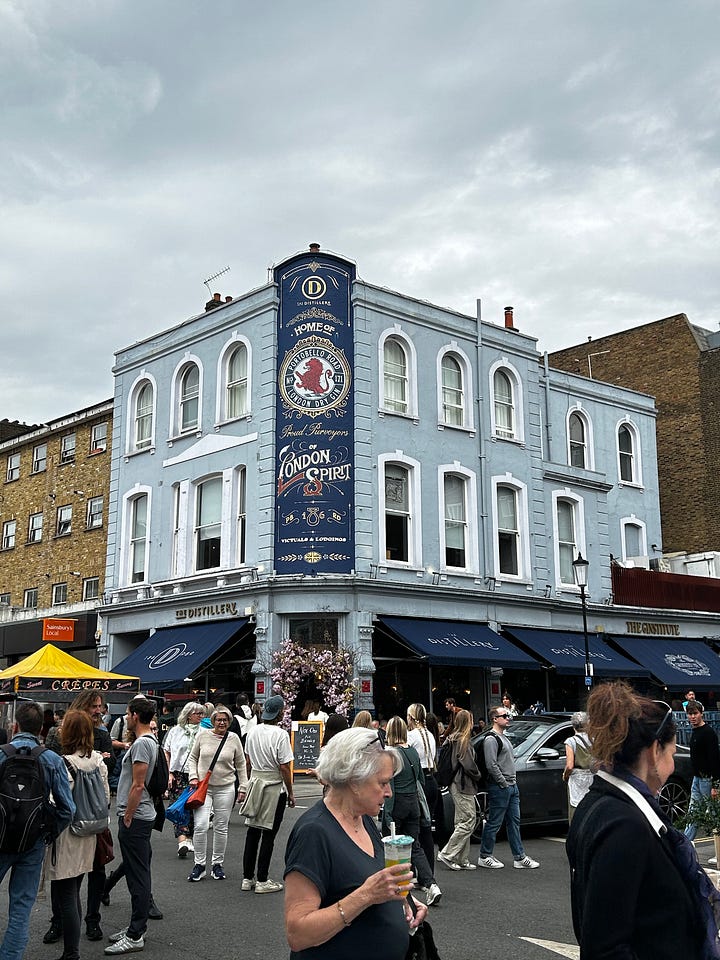



Hello! I am currently on the train from London to Birmingham watching the green countryside and grey-ish skies roll by. I’ve been in London since Thursday (it’s Sunday) and I apologize for this newsletter being a day later than usual. I always intend for this newsletter to be right on time but it will always published at the end/beginning of each month and on or around the 15th.
If you’re new here, welcome! I am excited that you found me and I hope that you find something interesting or funny, or learn something new. Thank you so much for subscribing, reading, clicking, and being here. :) I write a little, I have some tourism-related links, and I usually write a light review of a tourism industry scholarly article because I started this when I was missing the writing and research of graduate school. You can unsubscribe or share at any time and I keep this email list for my use, meaning, I would never sell it.
It has been nice to get away and see some new-to-me things in England, this is my fifth time in England since I was a teenager and I feel very privileged that I could make this trip happen since it was a bit spontaneous in nature. I had a friend with me in London and she went home today and I headed north to Birmingham. After a few days in Birmingham, I am taking the train to Cardiff, Wales then to the US later this week to attend a cousin’s wedding then back to Canada on Thanksgiving. Quite a busy 10 days and I am working some of it at North America hours but happy that I can make it work.
Links
I cannot introduce this podcast in a better or more appropriate way than the title itself: “Being a Person With Dwarfism Has Never Stopped Me From Exploring the World”, find the episode at this link for Afar’s podcast.
Three thriving diaspora communities in Minnesota’s twin cities.
The best and worst airports in North America, according to travellers.
36 hours in Chicago.
Tourism destinations are that are cracking down on overtourism.
Since I am here…Britain’s best towns and villages.
Suborbital space travel? In other words, incredibly fast travel on the horizon.
UNESCO added new sites to the World Heritage List.
Climate Change as seen through the eyes of Canadian Mountain Guides.
This edition’s article is not as uplifting as the last edition’s about physically impaired travellers who experienced a lot of kindness while travelling internationally. However, it is an important one.
This article is more factual than analysis or speculation and quite straightforward. It doesn’t feel like it was written to bore you or impress you with facts and numbers - you know what I am talking about, I’m sure you’ve read some scholarly articles that could help with insomnia. So, I encourage you to read it and look at the photos of how many of the mountain locations, glaciers, etc., have changed drastically in a century. This article asked registered mountain guides who specialize in mountain, alpine, ski, rock, via Ferrata, hiking, and top rope guiding in Canada to complete an online survey about their experiences in the outdoors and what they’ve noticed over their careers. Some startling findings included:
Almost all respondents (99%) indicated that during their guiding career they have noticed some degree of physical change within the region in which they guide, with 91% stating they have experienced a decrease in glacial coverage (Figure 3). The majority of respondents have also observed an increase in average summer and winter temperatures (73% and 70%, respectively), slope instability (65%), winter season rain (61%), and snowpack variability (57%).
Obviously, this is not limited to just Canada. Less snow is shortening ski seasons everywhere. This is not good for many reasons, not just because the ski season is shorter for those who ski. Less snow and a drier climate can result in more fires in the summer.
Apart from avalanches and icefalls, most respondents (>50%) stated they have noticed a slight or significant increase in environmental hazards while guiding in their mountain environment (Figure 4). Of those respondents, most noted an increase in the incidence of forest fires (81%), extreme weather events (e.g. tornadoes, severe thunderstorms, hailstorms) (71%), floods (68%), and rockfall (61%)
Ninety-four percent of the 169 interviewees believe that “outdoor recreation and adventure tourism should play a role in climate advocacy and awareness” (Rushton & Rutty, 2023). Of those interviewed, a majority of the respondents said their employer has already engaged in adaptation strategies or their company has plans to implement such strategies in the near future.
Outdoor recreation and adventure tourism fall within nature-based tourism and thus both rely heavily on having the nature part of that equation intact. These mountain guides have to be able to pivot easily and plan different routes for guiding each year, based on changes from season to season. One respondent commented:
I/we no longer assume historical glacier conditions exist; each summer and winter season new surveys are required to confirm glacier access, crevasse location/severity, icefall activity and other variables. Glacier conditions are changing rapidly, we now plan and travel much more conservatively, relying less on prior knowledge and increasing reliance on best travel practices and maintaining diligent observations of current conditions, even on familiar “trade-routes”.
The respondents wrote that their routes disappearing or being eroded isn’t the only thing happening, more natural hazards are popping up to make those traditional routes dangerous and thus they adapt by finding new guiding routes. Venues and guides have also adapted to the shorter winter season by creating and grooming trails and mountains for mountain biking and rock climbing. Summer sports get more time and perhaps new fans while winter enthusiasts have less time with sports.
Climate change is obviously a bigger problem than expensive sports/winter activity enthusiasts not being able to get their kicks for as long. Those who participate in adventure tourism and nature-based tourism are often just as aware of the changes in the environment and as passionate about them as the tourism stakeholders. The researchers of this article wrote that since climate change will continue to happen and is not predictable, mountain guides have to adapt quickly each year. This adaptive nature is not restricted to mountain guides, but to many other destinations that rely upon nature-based tourism.
This research and article make some good points about the need for adaptive strategies as tourism seasons shift for destinations. Climate change strategies for tourism and for residents are necessary for more than just nature-based tourism though and I’ll be looking for an article that focuses on coastal cities that are also popular tourist destinations. If you want to jump ahead, just do some searching about Miami or Venice.
That’s it for this edition. Thank you, as always, for being an audience that is very engaged. If you have questions or comments, you can email me or respond in the comments of this post.
Until next time,
Sonya



